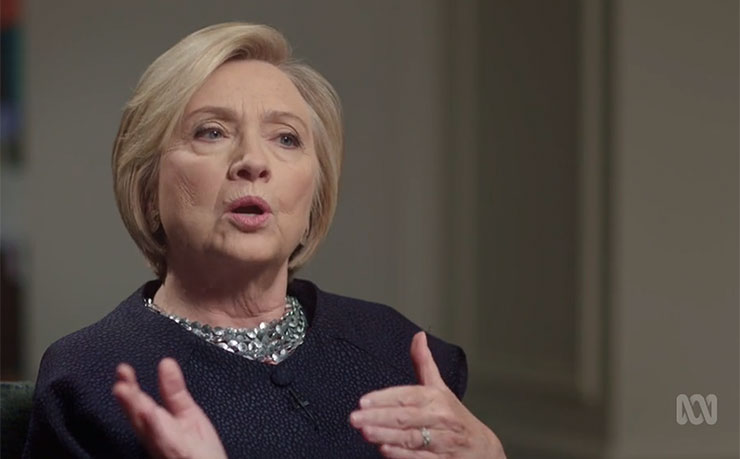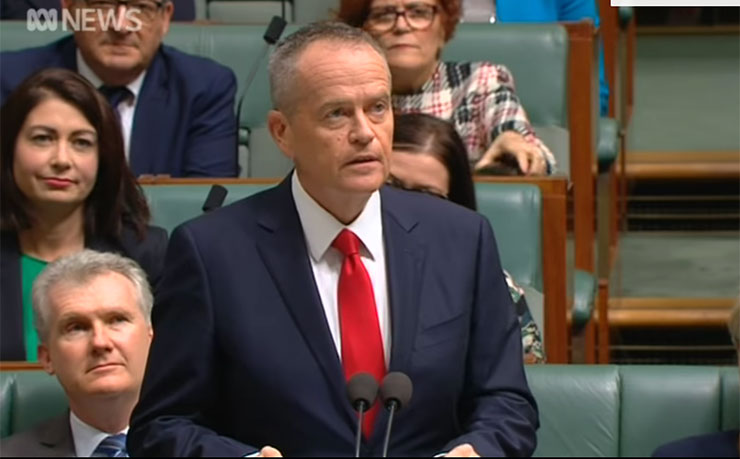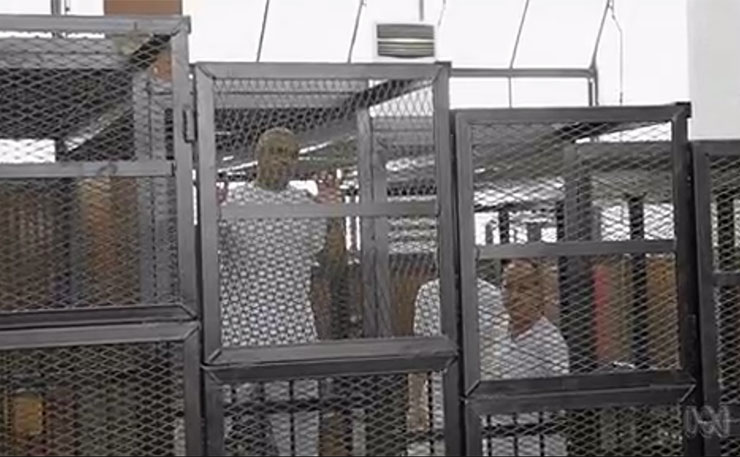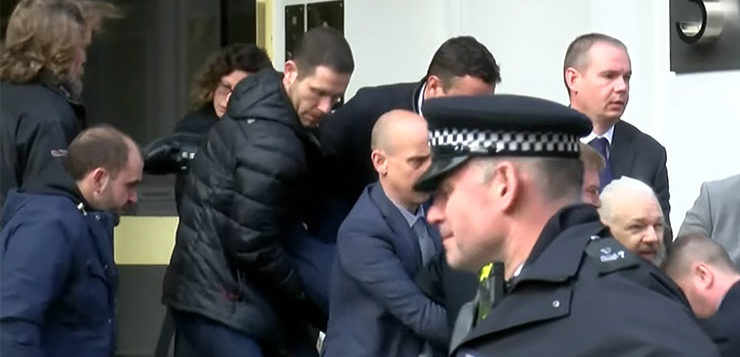DON’T MISS ANYTHING! ONE CLICK TO GET NEW MATILDA DELIVERED DIRECT TO YOUR INBOX, FREE!
Powerful interests are lining up to condemn Wikileaks’ Julian Assange to an ongoing life of incarceration. Stuart Rees wonders aloud whether Australian leaders will discover a backbone.
Julian Assange faces extradition to the United States to face a grand jury’s secretly concocted charge of ‘computer intrusion’ to obtain and reveal classified information.
Reaction to Assange’s arrest shows the orthodoxy of powerful people who think they’ve been ordained to protect establishment interests. Over the centuries, such interests have involved lying, deceit, corruption, wars and other forms of violence.
In the Assange case, ‘establishment’ includes US, UK and Australian military and intelligence operatives, politicians and journalists who say that Assange does not belong in their community.
Protecting Establishment Interests
Politicians who represented the establishment included former Prime Minister Julia Gillard who once claimed that Assange had committed a criminal offence. The Australian Federal Police advised that this was not correct.
Self-important UK and US politicians have condemned Assange as though they have a monopoly of wisdom and no-one could possibly question their judgement. Tory party elite have been out in force. Foreign Minister Jeremy Hunt’s proud clichés about Assange not being a hero have been marinated in the familiar boasting that British justice is admired around the world.
In the interest of justice, the British judge, Justice Snow, before whom Assange was to appear, played to the media gallery by his advance judgement that Assange was a narcissist.
As an alternative to accepting Hunt’s and Snow’s views, it’s reasonable to ask whether privileged individuals ever comprehend the values of those who expose the brutality of US foreign policy, whether they perceive the gutless collusion of other governments who do not question US violence.
In common with Hunt, former US Presidential candidate Hillary Clinton utters her latest hypocrisy, “The bottom line is that he (Assange) has to answer for what he has done, at least as it has been charged.” This politician was an enthusiast for the invasion of Iraq, the destruction of a country, the slaughter of hundreds of thousands of Iraqis, the Abu Graib torture, development of rendition and the spawning of Isis. Wikileaks cables exposed the consequences of this murderous war, most notably in the 2010 release of the collateral murder video showing the slaughter from a US Apache helicopter of at least twelve citizens in a Baghdad suburb.

A former member of Hillary Clinton’s ‘inner circle of advisers’ Yale graduate Neer Tander writes, without any evidence, “Assange was the agent of a pro fascist state Russia.” Sadly, Deputy ALP leader Tanya Plibersek tweeted that she liked Ms Tander’s claim. As long as Tander represents establishment interests, she can make any claim as long as it reinforces the not-to-be-questioned orthodoxy of a so-called freedom loving democracy.
In the same vein, the pompous US Secretary of State Mike Pompeo plays as the brave defender of the USA. His comments about Assange sound like a rewinding of video games: good democracy vs rogue regimes, the just against the unjust. Pompeo pitches himself on one side, Assange on the other. Years ago, says Pompeo, Assange would have been on the side of fascists and communists. Labelling complete. Pompeo version of truth must prevail.
Government Gumption
In reaction to Assange’ arrest, Australian politicians have been sitting on a fence. In his commentary on the prospect of more fence sitting, barrister Geoffrey Robertson has pleaded with the Australian government to show gumption. That is a reference to a product which was used to clean sinks, basins and drains. Robertson was asking for a different kind of sink cleaning, for evidence of vitality, spirit and verve from an Australian government in defence of one of their citizens.
Prime Minister Scott Morrison and Labor leader Bill Shorten say that Assange will receive the usual consulate assistance, possibly of the same kind that ‘protected’ David Hicks and Mamdouh Habib in their years of torture and incarceration in Guantanamo.

Instead of gumption, the current Foreign Minister Marise Payne says, “We are not in a position to interfere in his (Assange) legal matters in the UK or elsewhere.” In answer to a Jon Faine ABC Radio Melbourne interview, Deputy Labor leader Tanya Plibersek says that Assange will receive “the same consular assistance as any Australian who gets into trouble overseas.”
In answer to Faine’s query, “Are you sympathetic to his plight?”, Plibersek responded, “What happens to him depends on the UK judicial system.” History teaches that’s not the case. Political influence and community pressure freed the Bahrein footballer Hakeem Al Araibi, and if an Australian citizen was in trouble in Beijing or Moscow, politicians would experience a sudden rush of courage to protest on that citizen’s behalf.
The repeated claim that UK justice must take its course represents the same denial churned out by Morrison’s ministers regarding imprisonment of asylum seekers held by a Nauruan government funded by Australia: “The care of asylum seekers on Nauru is the responsibility of the Nauruan government.” This lying has been another way to conceal establishment interests.
Journalists’ Treachery
In the Assange case, professional journalists have been reluctant to support Assange. The elite of journalism enjoy being part of the establishment even as they write that they are for free speech and a free press. In the Sydney Morning Herald of April 13, Peter Greste wrote an article titled ‘Assange is no journalist and his arrest isn’t about press freedom.’
Although Greste insisted that as a former prisoner in an Egyptian jail he had sympathy for Assange, he showed no compassion, let alone any consideration of the value of the Assange/Wikileaks revelations which have benefitted conventional journalists’ stories and the incomes of major newspapers.
Instead, Greste became preoccupied with saying that he was conscientious and responsible and therefore a real journalist. Citizen journalists like Assange, who in 2011 won the Walkley Award for ‘Most Outstanding Contribution to Journalism’, are not real.

Greste washing his hands of Assange reads like professional jealousy via promotion of a trade demarcation dispute: respectable journalists versus unworthy ones. The worthy journalists are responsible because they analyse material. With that self-image in mind, Greste wrote that by dumping classified cables on his website, Assange put lives at risk even though Greste does not appear to have examined the cables to which he refers.
In a forthcoming book, ‘What Uncle Sam wants’, Professor Clinton Fernandes has completed such an examination. He concludes that Assange and Wikileaks did not identify people by name and put no-one’s lives at risk. In the same analysis, Fernandes shows that in the cables which revealed US diplomats’ communication with their equivalents in other countries, a main concern was to promote the success of US corporations so that they could dominate world economies.
In answer to Greste’ and others’ beliefs that they are the real journalists, Bernard Keane, political editor of Crikey, says, “If you don’t think Wikileaks is a publisher, or you think Assange should be rendered to the US then you think that what they revealed – war crimes, indiscriminate murder, systematic corruption – should have stayed secret.”
The US Culture of Revenge
The fate of Julian Assange and the re-arrest of Chelsea Manning show US swagger and violence being deployed to maintain establishment interests.
This is not a legal controversy. It is a massive political issue. The US culture of revenge has to be exposed and challenged. Grass roots outrage needs to be mobilized. But if Australian politicians are to join community protests, it looks as though large doses dozes of gumption will be required.
Donate To New Matilda
New Matilda is a small, independent media outlet. We survive through reader contributions, and never losing a lawsuit. If you got something from this article, giving something back helps us to continue speaking truth to power. Every little bit counts.




